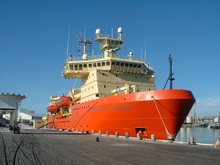the sensitivity of melting ice shelves to oceanic heat sources. My
main personal goal for this trip is learning -- about the process,
execution, scope, and difficulties in making observations of the
Antarctic oceans. I want to use that information to help guide the
efforts which I undertake in the next few years (also beyond, but I'm
primarily thinking about finishing the Ph.D). Having given my talk
about issues surrounding the modeling of ice shelves, with particular
emphasis on the Amundsen Sea, and having received some input (both
direct and indirect) I think that I have narrowed down the areas
where I can make a contribution.
The way that I'm starting to look at the modeling world is like a
scatter plot (a slighly nerdy way to do it, OK). The axes are level
of idealization and the scale. The scale (at least of my interest)
varies from the individual ice shelf scale to the the southern ocean.
The level of idealization is trickier to quantify because it can be
due to the number of physical processes included, or time or spatial
variability, and maybe other factors as well. The type of experiments
which are needed vary across both of these criteria so I am not at a
loss for opportunities. But I also need to include the level of
interest of the community, and not unimportantly, my own interest and
personal satisfaction (thanks amy for reminding me of that last
point!).*
There are likely too many unknowns to attack this problem in a way
that would satisfy both my desire for comprehensiveness and
confidence in the end result, especially in the next few years. I
think I can get a better answer to questions in the Amundsen, given
uncertainties in modeling and data, by looking at two specific
regions in isolation -- under the ice shelf and at the continental
shelf break. The other axis -- idealization -- is tougher to figure
out. I have some ideas, but I need more time to think about it. Six
days across the Drake Passage may help that.
If you have any ideas, your input is welcome.
C
*Personal Rambling follows (optional).... scientists have a difficult
task in justifying their research at the larger scale (which means
they're looking to solve a "big" problem) and being required to have
a single minded focus on proving something (which is only possible
when the problem is tractable). I think good (and how you evaluate
good is a whole 'nother matter -- best funded, most respected,
published, etc?) scientists have to learn to do both. My personal
analysis is that I'm a little unique (as a graduate student) in that
I tend to set large, maybe a little vague, goals, justifying the work
first, and working backwards from there to the source of uncertainty
in the problem. My natural tendency then is to try to include
everything to answer the bigger picture problem, when I think science
only really works in small steps. So either I have to learn to do
both of these, or find some field/job where I don't have to do both.


No comments:
Post a Comment